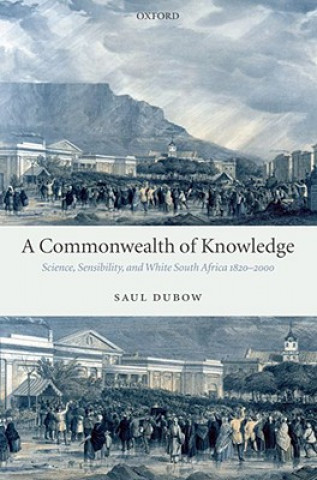
Dostava
Savjetnik za kupnju





Proizvod vam ne odgovara? Nema veze! Možete nam vratiti unutar 30 dana
 Poklon bon
u bilo kojoj vrijednosti
Poklon bon
u bilo kojoj vrijednosti
S poklon bonom ne možete pogriješiti. Za poklon bon primatelj može odabrati bilo što iz naše ponude.
Commonwealth of Knowledge
 Engleski
Engleski
 800 b
800 b
30 dana za povrat kupljenih proizvoda
Moglo bi vas zanimati i


A Commonwealth of Knowledge addresses the relationship between social and scientific thought, colonial identity, and political power in nineteenth- and twentieth-century South Africa. It hinges on the tension between colonial knowledge, conceived of as a universal, modernizing force, and its realization in the context of a society divided along complex ethnic and racial fault-lines. By means of detailed analysis of colonial cultures, literary and scientific institutions, and expert historical thinking about South Africa and its peoples, it demonstrates the ways in which the cultivation of knowledge has served to support white political ascendancy and claims to nationhood. In a sustained commentary on modern South African historiography, the significance of 'broad' South Africanism - a political tradition designed to transcend differences between white English- and Afrikaans-speakers - is emphasized. A Commonwealth of Knowledge also engages with wider comparative debates.These include the nature of imperial and colonial knowledge systems; the role of intellectual ideas and concepts in constituting ethnic, racial, and regional identities; the dissemination of ideas between imperial metropole and colonial periphery; the emergence of amateur and professional intellectual communities; and the encounter between imperial and indigenous or local knowledge systems. The book has broad scope. It opens with a discussion of civic institutions (eg. museums, libraries, botanical gardens and scientific societies), and assesses their role in creating a distinctive sense of Cape colonial identity; the book goes on to discuss the ways in which scientific and other forms of knowledge contributed to the development of a capacious South Africanist patriotism compatible with continued membership of the British Commonwealth; it concludes with reflections on the techno-nationalism of the apartheid state and situates contemporary concerns like the 'African Renaissance', and responses to HIV/AIDS, in broad historical context.
Informacije o knjizi
 Engleski
Engleski




 Kako kupovati
Kako kupovati




















